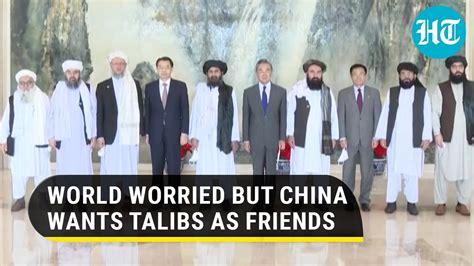
Afghanistan: Taliban welcomes first new Chinese ambassador since takeover
The Taliban said Zhao Xing’s appointment is a sign for other nations to establish ties with its government.
No country has formally recognised the Taliban government, which has been criticised over human rights violations and crushing women’s rights.
Analysts say Mr Zhao’s appointment is part of China’s moves to cement its influence in the region.
Afghanistan is at the centre of a region that is key to Beijing’s Belt and Road infrastructure initiative. Beijing has previously said that it wants to invest in Afghanistan’s natural resources, estimated to be worth $1 trillion. These include extensive copper, lithium and gold deposits.
“By being the first to name an ambassador post-takeover, China aims to position itself as an influential actor in the region – a possible diplomatic flexing of muscles, especially when many Western countries are still hesitant to engage with the Taliban,” said Farwa Aamer, Director of South Asia Initiatives at the Asia Society Policy Institute.
China’s foreign ministry on Wednesday said it will “continue advancing dialogue and cooperation” with Afghanistan and that its policy towards the country is “clear and consistent”. Mr Zhao’s appointment is part of a “normal rotation” of Chinese ambassadors to Afghanistan, it added.
China is one of a handful of nations to maintain working missions in Afghanistan since the Taliban swept back to power. Beijing did not signal if the appointment was part of a wider move to recognise the Taliban government.
Taliban leaders received Mr Zhao at the presidential palace in the capital Kabul on Wednesday in a lavish ceremony that included acting prime minister Mohammad Hassan Akhund and acting foreign minister Amir Khan Muttaqi. He replaces Wang Yu, who took up the role in 2019 and completed his tenure as ambassador last month.
The appointment comes in the wake of condemnation from the UN and other international rights groups over the Taliban’s treatment of women, and its decision to reinstate public executions and lashings.
Under Taliban rule, women are barred from working and going to school, among a swathe of other restrictions. Their suppression of women’s rights is among the harshest in the world.
The Taliban has also been accused of sheltering terror groups in Afghanistan, which they have denied.
But maintaining diplomatic ties with the Taliban is important to China for economic and security reasons, analysts say.
Militants along Afghanistan’s border with China’s Xinjiang region have targeted Chinese projects in the past, sometimes as retaliation for Beijing’s mistreatment of its Muslim minorities such as Uyghurs. Reporting by the BBC supports rights groups’ accusations of mass detentions, forced labour and abuse of a million Uyghurs. China denies any wrongdoing.
A few thousand Uyghurs who have, over the years, fled across the border to Afghanistan also now fear they can be victims of China’s growing influence in the country.
In January this year, the Taliban signed a contract with a Chinese firm in the first major energy extraction agreement with a foreign firm since they seized power.
And earlier this year, China, Pakistan, and Afghanistan also agreed to extend the Beijing-backed China-Pakistan Economic Corridor into Afghanistan, giving it a prominent role in the ambitious initiative. The leaders of Pakistan and China said at the time that they wanted to help “rebuild” Afghanistan.
Observers say the role Afghanistan plays at the Belt and Road Initiative conference this October, and in the broader project, will be watched closely.
Source » bbc.com





